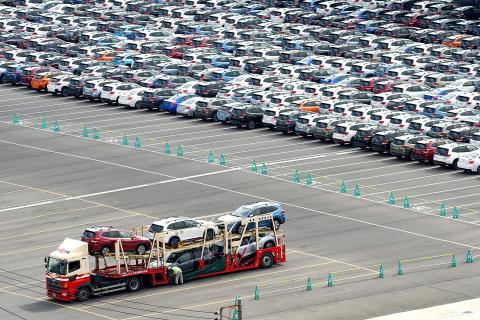Toyota Motor Corp is boosting its stake in Subaru Corp to about a fifth of the smaller automaker, as Japan’s No. 1 car company adds more heft to face a future of self-driving vehicles, electrification and evolving transport services.
The maker of Forester and Outback wagons is also taking a stake in Toyota, strengthening their capital ties and collaboration, according to a statement from the companies.
Toyota, which is increasing its holding to about 20 percent from 17 percent at a cost of about ¥75 billion (US$700 million) at yesterday’s closing price, plans to make Subaru an equity affiliate, bringing sales and profit from the automaker onto its income statements.

Photo: Bloomberg
Toyota, which first took a stake in Subaru in 2005, is spreading its bets.
The Japanese automaker, Volks-wagen AG and other vehicle companies have been forging partnerships as they face an uncertain future, with new technologies and business models disrupting the US$2.23 trillion global auto industry.
Toyota is investing in electric and autonomous vehicles, fuel-cell and hybrid cars, as data-intensive connected cars.
“This is part of Toyota’s recent efforts to find allies,” Bloomberg Intelligence auto analyst Tatsuo Yoshida said. “They’re getting ready for the next era that includes self-driving technology. Toyota is taking a 360-degree view.”
The two companies have jointly developed automobiles since striking up their partnership. Toyota is by far the larger manufacturer, with 10.6 million cars and trucks produced last year. Subaru made about 1 million vehicles last year, a decline of 5 percent and the first drop in seven years.
Toyota also owns stakes of less than 10 percent in both Suzuki Motor Corp and Mazda Motor Corp.
As part of their pact, Toyota and Subaru are to jointly develop all-wheel drive vehicles — a traditional Subaru strength. They are also to work together on the new Toyota 86 and Subaru BRZ sports cars.
“For Toyota, this alliance brings not just technologies, such as Subaru’s i-Sight, all-wheel-drive and flat engines, but also safety and security know-how,” Yoshida said. “It brings in elements that Toyota doesn’t have.”
By consolidating Subaru to its accounts, Toyota would add about ¥50 billion to annual profit, Macquarie Capital analyst Janet Lewis said.
The deal benefits both companies, as Subaru also gets access to technology it would not be able to develop itself, she said in a note.

Taiwan Semiconductor Manufacturing Co (TSMC, 台積電), the world’s biggest contract chipmaker, booked its first-ever profit from its Arizona subsidiary in the first half of this year, four years after operations began, a company financial statement showed. Wholly owned by TSMC, the Arizona unit contributed NT$4.52 billion (US$150.1 million) in net profit, compared with a loss of NT$4.34 billion a year earlier, the statement showed. The company attributed the turnaround to strong market demand and high factory utilization. The Arizona unit counts Apple Inc, Nvidia Corp and Advanced Micro Devices Inc among its major customers. The firm’s first fab in Arizona began high-volume production

VOTE OF CONFIDENCE: The Japanese company is adding Intel to an investment portfolio that includes artificial intelligence linchpins Nvidia Corp and TSMC Softbank Group Corp agreed to buy US$2 billion of Intel Corp stock, a surprise deal to shore up a struggling US name while boosting its own chip ambitions. The Japanese company, which is adding Intel to an investment portfolio that includes artificial intelligence (AI) linchpins Nvidia Corp and Taiwan Semiconductor Manufacturing Co (TSMC, 台積電), is to pay US$23 a share — a small discount to Intel’s last close. Shares of the US chipmaker, which would issue new stock to Softbank, surged more than 5 percent in after-hours trading. Softbank’s stock fell as much as 5.4 percent on Tuesday in Tokyo, its

COLLABORATION: Softbank would supply manufacturing gear to the factory, and a joint venture would make AI data center equipment, Young Liu said Hon Hai Precision Industry Co (鴻海精密) would operate a US factory owned by Softbank Group Corp, setting up what is in the running to be the first manufacturing site in the Japanese company’s US$500 billion Stargate venture with OpenAI and Oracle Corp. Softbank is acquiring Hon Hai’s electric-vehicle plant in Ohio, but the Taiwanese company would continue to run the complex after turning it into an artificial intelligence (AI) server production plant, Hon Hai chairman Young Liu (劉揚偉) said yesterday. Softbank would supply manufacturing gear to the factory, and a joint venture between the two companies would make AI data

DOLLAR SIGNS: The central bank rejected claims that the NT dollar had appreciated 10 percentage points more than the yen or the won against the greenback The New Taiwan dollar yesterday fell for a sixth day to its weakest level in three months, driven by equity-related outflows and reactions to an economics official’s exchange rate remarks. The NT dollar slid NT$0.197, or 0.65 percent, to close at NT$30.505 per US dollar, central bank data showed. The local currency has depreciated 1.97 percent so far this month, ranking as the weakest performer among Asian currencies. Dealers attributed the retreat to foreign investors wiring capital gains and dividends abroad after taking profit in local shares. They also pointed to reports that Washington might consider taking equity stakes in chipmakers, including Taiwan Semiconductor